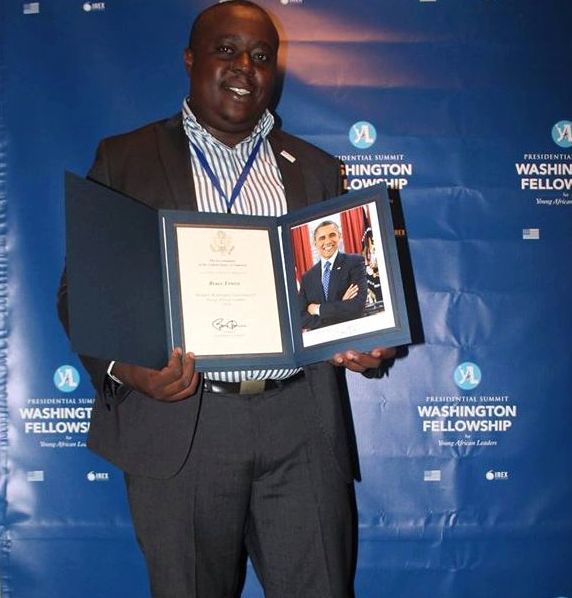
Bruce: from BBS to the White House
26 August 2014
Six weeks spent at one of the most prestigious American universities to study business, entrepreneurship or civic leadership followed by a three-day summit in Washington with President Obama: that was the structure of the Mandela Washigton Fellowship. The programme brought 500 young African leaders (from over 50.000 applicants) to the U.S. and aims to form African talents who will be the best at assuming key roles in the development process of the African continent. Among them is Bruce Ernest from Zambia, who earned an MBA in Green Energy and Sustainable Businesses (class of 2013) at BB
Would you mind telling us something about the 6 weeks you have spent in Washington DC and your meeting with President Obama?
The meeting with President Barack Obama gave me hope for Africa. It indicated to me that a new era has begun for the world’s least developed continent and the journey for good governance, democracy, peace and economic growth has started. It made me believe and gave me hope that poverty, violence and diseases can be beaten on the continent. It indicated that injustice against women and children can no longer be tolerated. It gave a great belief that Africa is ready to change and further develop.
During the Fellowship, I was enrolled in the Business and Entrepreneurship track to hone my skills in the area of business, design thinking, leadership and entrepreneurship. I was linked to resources and team building activities that further enhance my ability to lead and participate in highly effective teams. The leadership training help me build leadership presence and awareness in organizations while the design thinking helped me in the idea process and the development of human centered designs in business and social environments. In addition, I was given a chance to interact with world leading companies and financial institutions.
To what extent has this experience been important to you?
This experience has given me recognition and an opportunity to continue contributing to improvements of poor communities in my country and Africa. It reassured me that I am on the right path and should continue doing good work for the benefit of the vulnerable in society.
The 6 weeks of the Washington fellowship was an enlightening moment because it helped me to gauge the achievements of my life starting from an early age through university and Bologna Business School and the contributions I made to society later on. It made me realize that hard work and commitment always pays off in the end. I have spent time and resources for education and to improve my skills for the global market and this opportunity gave me the assurance that I am headed to greatness.
Which are the main points of strength and weakness in this program?
The main point of strength of the process was that knowledge was enhanced, networks were built and capacity was improved between America and Africa and among Africans. The interaction strengthened cultures and learning took place. Personally, it made me develop networks with leaders in business, academia, civil society and politics. I was able to interact with Senators and other law makers, CEOs from companies like Seventh Generation (a company I learnt about during my Alma days), Presidential Aids, renowned professors like Gregg Fairbrothers, venture capitalist CEOs with capacity of building multi-million dollar companies and the United Nations Foundation President and CEO. By any standard, this network would be considered the best in the world.
The weak point was that the fellowship was misconstrued as an inversion of Africa by the West and received bad publicity in some circles. However, the positives of the fellowship outweigh the negatives and African governments have accepted the activity as an area of cooperation between Africa and the United States.
What is the role that the new generation of African leaders, entrepreneurs and activists can play to enhance the continent’s development?
The new role for African leaders will be to improve governance, public and civic leadership and initiate businesses that will create jobs for communities across Africa and the world. Africa has a young population, and information obtained from this fellowship will help kick-start ideas and innovation that will change the way the world views Africa. Africa is the last frontier of development and 6 out of 10 of the fastest growing economies in the world are African. Africa has a long way to go but there is a need of African solutions for African problems. It is time for the continent to enjoy peace, health and prosperity like many other parts of the world. With the fellowships and many other efforts like this, Africa will strengthen democratic institutes, public management and environment of doing business.
I believe that I, like many others, will be a leader and leave an African continent that is stronger and better for our children’s children. Skills in business, leadership and management are key to Africa’s development and poverty reduction.
How would you define your personal commitment to your country’s growth?
I am a sustainable business expert and I have been committed and will continue my commitment to empowering women, youth and children with business ideas and initiatives that will help them move out of poverty. I believe in continuous development and this stage of my life is another stepping stone, just like Bologna Business School was.
Why was the MBA at Bologna Business School relevant to your personal, academic and professional life?
The experience in Washington made me realize that what I have been taught at Bologna Business School was of an international standard. In fact, I have been able to challenge the intelligent minds I have met and contributed positively to highly effective teams. I realized that the cross-cultural environment at Bologna Business School worked to my advantage. I was not afraid of participating with an open mind because of Bologna Business School, I was considered highly skilled and exposed to the international business environment. All in all, the Mandela Washington Fellowship was educational, inspiring and breathtaking. During the presentation of my final project at BBS, I defined myself as a Young African who belongs to the next generation of progressive leaders. That indeed has come true and I am grateful to BBS management, teaching staff and the class of 2012/13 for believing in me. I now remain hopeful and encourage current and future students of the school to keep working hard and know that BBS is just the beginning of good things to come. Just remember the words of Nelson Mandela, “it always seems impossible until it is done”. I salute you all. Grazie mille!
